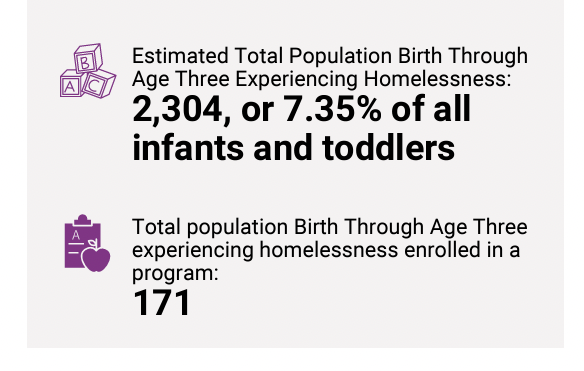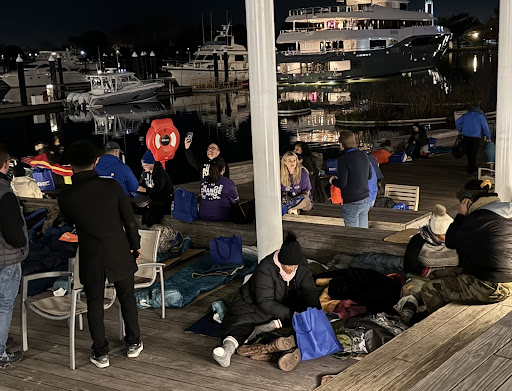Over 7% of all children in D.C. under age three experience homelessness, according to a recent report. That is more than any state in the U.S.
This report claims to be the “most comprehensive” analysis of its kind, and the first ever to collect state-by-state data on infant and toddler homelessness. It was published by SchoolHouse Connection, an advocacy organization that aims to “[overcome] homelessness through education.”
Around 2.5%, or over 364,000, of children under age three experience homelessness across the country, according to SchoolHouse Connection. Their report builds on the findings of a 2023 study published in the Proceedings of the National Academy of Sciences, which revealed that children under age five are the largest age group of people who have had an eviction filed against them in the United States. Furthermore, 15.2% of infants and toddlers across the country live in crowded housing.
The SchoolHouse Connection report centers the definition of homelessness from the McKinney-Vento Homeless Assistance Act of 1987, where “homelessness” includes not just people who are visibly unsheltered or staying in shelters, but also people who do not have a lease to their name and subsist in precarious housing situations. This thus sets the report apart from common metrics for homelessness like the annual Point-in-Time (PIT) Count — a federally-mandated survey of the people sleeping in shelters as well as in streets and other places not intended for habitation.
Because of this distinction, the PIT Count is generally accepted as a drastic undercount even though it is a go-to annual data point for measuring homelessness. It overlooks many unseen unhoused people who cannot access shelters due to shortage of space, eligibility requirements, or fear. And it deliberately excludes people who temporarily “double up” with family, friends, or acquaintances with no guarantee for the longevity of their stay.
Education data, like what SchoolHouse Connection analyzed, is also collected annually. But it uses the McKinney-Vento Act definition of homelessness, instead of the U.S. Department of Housing and Urban Development’s more narrow definition that the PIT Count relies on. Public schools often report higher numbers of students experiencing homelessness than the PIT count. While families in fluid doubled-up housing circumstances are considered unhoused under federal early care and education law, they are excluded from data like the PIT count.
For Erin Patterson, the author of the report, child homelessness demands especially urgent attention because children who experience homelessness face long-term repercussions, including delays in language, literacy, and socio-emotional development — as well as mental illnesses and complex trauma.
This persists throughout the lifetime of infants and toddlers. Only 68% of high school students experiencing homelessness graduate — the lowest out of any subgroup — compared to 85% for all students across the country. High school students experiencing homelessness are also 10 times more likely than their peers to become pregnant or get someone else pregnant.
“I would encourage anyone who is in a position of power to really understand a one-year-old experiencing homelessness now will be a kindergartner experiencing homelessness in four years,” Patterson told Street Sense Media. “In 18 years, they will be in high school or trying to graduate, because homelessness has long-term, lasting negative consequences on young children.”
SchoolHouse Connection advocates for early childhood development programs to break the cycle of homelessness. Currently, only 7.4% of infants and toddlers experiencing homelessness in D.C., or 171 children, are being served by early childhood development programs. (Free early childhood development programs, like early head start, are available to low-income families in D.C. through organizations including but not limited to Martha’s Table, 202-328-6608; Bright Beginnings, 202-842-9090; and United Planning Organization, 202-238-4733.)
Patterson pointed to “innovative solutions” that bundle early childhood development programs with housing programs, like Head Start on Housing in Connecticut. Under this program, which started in January 2022, the Department of Housing in Connecticut allocates housing vouchers to families whose children are enrolled in Early Head Start or Head Start programs. Consequently, this allows families experiencing doubled-up homelessness to access housing assistance.
Patterson believes such solutions could be modeled in D.C.
“D.C. was one of the first cities to have universal Pre-K, so I think there is a lot of room for innovation here when it comes to meeting these needs in creative ways,” Patterson said.
The future of social safety net programs — from early childhood development to housing — remains up in the air. On Apr. 3, Mayor Muriel Bowser released her proposed budget for fiscal year 2025, in which many such programs were cut: including the Emergency Rental Assistance Program and the Home Purchase Assistance Program.
Advocates for early childhood development programs rallied ahead of an education conference on Apr. 5 in protest of the slashing of the Early Childhood Educator Pay Equity Fund, which promotes early education through offering teachers and caregivers money to compensate for their low wages.
“Eliminating the Pay Equity Fund and gutting the child care subsidy program will decimate the early education sector, said Tazra Mitchell, Chief Policy and Strategy Officer at D.C. Fiscal Policy Institute, at a budget oversight hearing on Apr. 8 chaired by the Committee on Health.“[Bowser’s] approach will set back the progress that DC has made on poverty reduction, greater economic inclusion, and closing racial and gender disparities that harm us all.”








